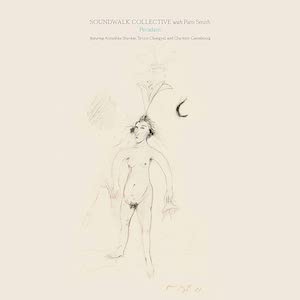
Soundwalk Collective with Patti Smith – Peradam
Bella Union – 4 September 2020
Peradam is a stone. “It is a true crystal” and is “so perfectly transparent…that the inexperienced eye barely perceives it”. Peradam is the creation of René Daumal from his incomplete novel Mount Analogue. You don’t necessarily need to know this, at least at the start of the journey, but it is certainly something to consider on the way.
The journey starts. The place where you are is where you begin. The place where you start can be Peradam, the third of the triptych of albums from Soundwalk Collective (Stephan Crasneanscki and Simone Merli) and Patti Smith. Each journey starts with a French poet or author and in this case, it is the work of Daumal, a man of limited life span – he died at 36 – and of corresponding literary output. But you need only write one thing to be remembered by, to inspire, to stimulate, to promote that first step.

Peradam the album, consists of a series of vignettes, observations or glimpses, not necessarily in an order but then that adds to the questions. The wind hurtles around Nanda Devi, running in waves over the second-highest mountain in India. Sacred to Hindus, Nanda is an angry goddess and consort of Shiva. She is notoriously inaccessible, or is it that she keeps her distance, whilst her presence is partly hidden by natural defences? The chanting of Sherpa Dhan Singh Rana encourages Crasneanscki as they walk up the mountain, like Daumal, like others, seeking that connection between earth and sky, the natural meeting point of the spiritual and the temporal.
A heartbeat in drums (Tenzin Choegyal) pulls us into the title track. We can hear it, feel it. But what do we hear? Is it the rhythm? Or is it deeper, more visceral? If the first track presents the challenge of the journey, by the middle of Peradam you know that it is a challenge – a challenge you want to accept, embrace, make your own. Smith’s intonations echo and swirl around, providing both encouragement and warning. Do the words say one thing yet the voice another? Listen.
Daumal, an alpinist, compared climbing to art and saw that both were interdependent. Only through art could you see what cannot be seen. So it is here. The question is how do you know? And how do you know yourself? Perhaps read the Upanishads? Better still, live by them? Anoushka Shankar sensuously comforts – but again there is an edge – as we consider duality, what is being sought at the top of the mountain. To understand we have to have Knowledge of The Self:
Into a blind darkness go those dedicated to non-knowing;
into deeper darkness go those content with knowing.
Out of the darkness comes the light of a new dawn. A soundscape of Dawn in Rishikesh. Dawn is sudden, predictable, announced by temple horns, chattering birds and the lament of dogs as the cool of the night gives way to the heat of the day.
Spiritual Death chastises. Conversation on the threshold; the destination is not necessarily reached just because you have ‘an accurate and detailed itinerary’. How do you know what you are looking for? Where do you start from? Daumal’s poem, The Four Cardinal Times may help, performed here in both the original French by Charlotte Gainsbourg and in English by Smith. The passage of the sun may mark the day, its start, its ‘Lord of Noon’ and its end but it is ‘the great midnight’ that ‘keeps watch’. We all need to be watched over whether our journey is across time or space.
Mother Ganga washes against the land. Vera is the name of Daumal’s wife; it is Greek for ‘truth’, and it is a prefix for one of the depictions of the Hindu goddess Laksmi. Vera questions what is death: “I am dead, I am dead because I have no desire…” Daumal says this is the path he saw before him:
Seeing you are nothing, you desire to become;
In desiring to become, you begin to live.
Life ends to be renewed. The sacred Ganges laps at the souls as they are transported to their reincarnation.
The tale of The Rat, fit for today as the unknowing consequences of our actions never changes. We don’t see, we don’t think that the old rat is performing a service by its restricted diet of sick and dying wasps, keeping the spread of disease at bay. The same is true in places about vultures. Who values the vermin? Do we really know? Do we presume?
And so the turning point of this particular journey is reached. It is not the end, though. Peradam pulls you in, catches you, takes you with it and at the end… leaves you to wonder what happened, where do you go now? Back to the start or on again? Having travelled this small path, even if you go back, do you know what you saw or what you heard?
It is not the end. It becomes what you want. Now you have taken that journey, you know some of it, filled with memories and impressions, the seen and the unseen. What is visible and what is invisible? Are you able, willing, to see the peradam? You will go back and listen again, and again. You will take it with you. In your ears? Perhaps? In your head? Yes. Once heard you will want to hear it again. But beware. There is no correct interpretation. There is no answer. It is what you make of it. As Smith, herself says “In the end, it goes out into the world and becomes whatever it becomes”. It is not what it is, it is what it does. It could be the place where you are, the place where you have to begin.
Intriguing; absorbing; excellent.
Peradam will be released 4th September via Bella Union and is available to preorder here.


